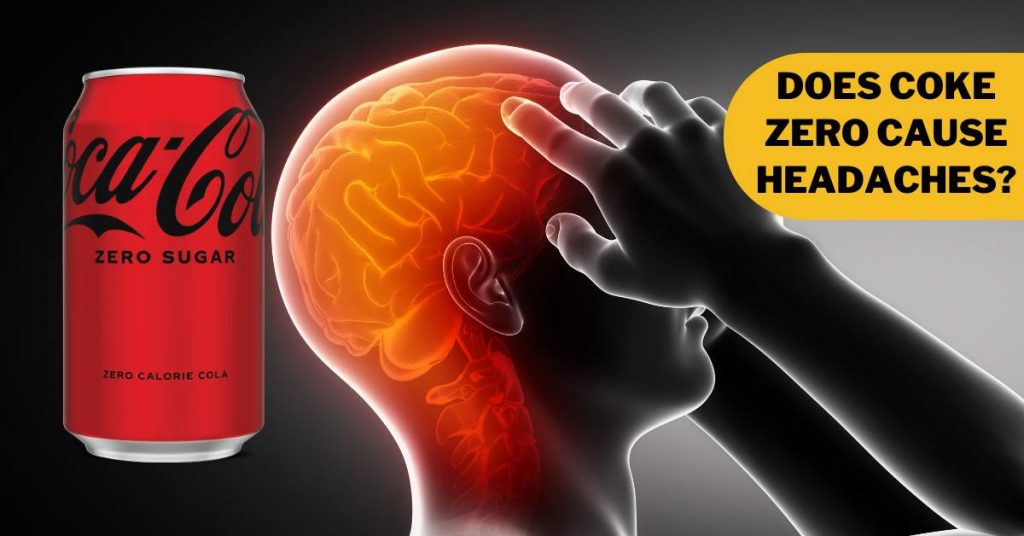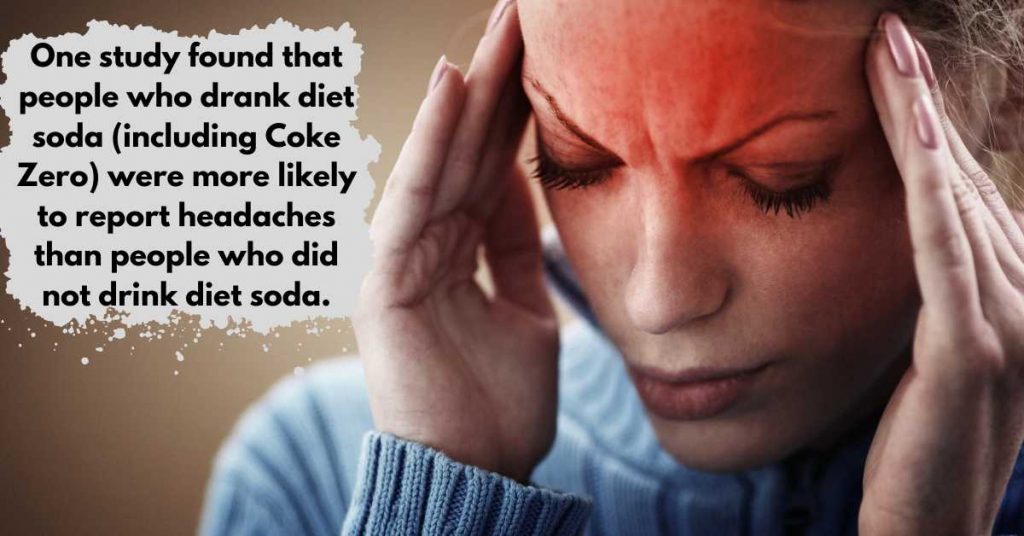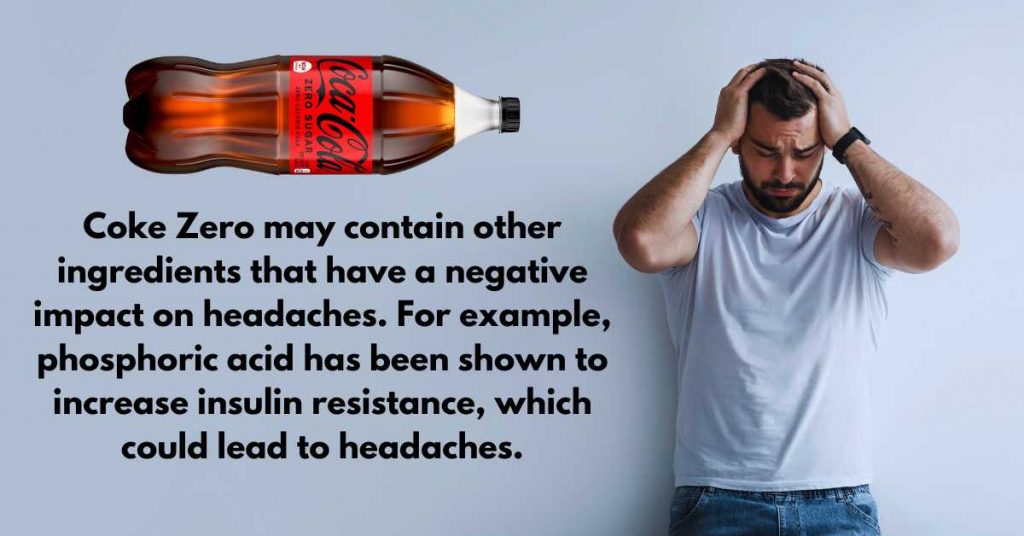Does Coke Zero Cause Headaches? What the Science Says

Does Coke Zero Cause Headaches? What You Need to Know.
Like other diet sodas, Coke Zero contains artificial sweeteners such as aspartame and acesulfame potassium. While the FDA and other health organizations have approved these sweeteners as safe for consumption, some individuals may be sensitive to them. In rare cases, some people have reported experiencing headaches after consuming Coke Zero. However, headaches are not widespread or scientifically proven directly caused by Coke Zero consumption. Headaches can have various triggers, and individual responses to specific ingredients may differ. Suppose you experience headaches after consuming Coke Zero or any other diet soda. In that case, you should reduce or avoid its consumption and consult a healthcare professional to identify potential triggers and explore alternatives.
- Research and Study
- What is Coke Zero?
- Understanding Artificial Sweeteners
- The Safety of Artificial Sweeteners
- Possible Link Between Coke Zero and Headaches
- Individual Sensitivities and Reactions
- Other Factors that Contribute to Headaches
- Managing Headaches and Sensitivities
- Bottom Line
- FAQs
- Can Coke Zero cause headaches for everyone?
- Are artificial sweeteners safe to consume?
- How can I manage headaches triggered by Coke Zero?
- Are there other factors besides Coke Zero that can cause headaches?
- Should I consult a healthcare professional if I experience headaches after consuming Coke Zero?
Research and Study
One study published in the journal "Headache" found that people who drank diet soda (including Coke Zero) were likelier to report headaches than those who did not. This study also found that the more diet soda people drank, the more likely they were to report headaches.
However, other studies have not found a link between Coke Zero and headaches. For example, one study published in the journal "Nutrition Reviews" found no difference in the incidence of headaches between people who drank diet soda and those who did not.
So, what does all of this mean? It is still not entirely clear whether Coke Zero causes headaches. More research is needed to determine the link between Coke Zero and headaches.
If you are concerned about whether Coke Zero may be causing your headaches, it is best to speak to your doctor. They can help you assess your risk and recommend whether Coke Zero is safe.

Here are some other things to keep in mind about Coke Zero:
- Coke Zero is a low-calorie beverage, but it is not calorie-free. It contains about 34 calories per 12-ounce can.
- Coke Zero is sweetened with artificial sweeteners. These sweeteners are safe for most people, but some may be concerned about their long-term effects.
- Coke Zero is a carbonated beverage. Carbonated beverages can cause bloating and gas in some people.
Ultimately, whether or not to drink Coke Zero is a personal decision. If you are concerned about the potential effects of Coke Zero on your health, it is best to speak to your doctor.
Like other diet sodas, Coke Zero contains artificial sweeteners such as aspartame and acesulfame potassium. These sweeteners have been approved for consumption by regulatory authorities, including the U.S. Food and Drug Administration (FDA), and they are generally considered safe for most people.
However, some individuals may be sensitive to artificial sweeteners, and for them, consuming Coke Zero or other diet sodas could potentially trigger headaches or other adverse effects. The exact reasons for these reactions are not fully understood and can vary from person to person.
It's worth noting that headaches can have multiple causes, including dehydration, caffeine withdrawal, stress, or other dietary factors. Therefore, it can be challenging to pinpoint Coke Zero precisely as the cause of headaches in an individual without considering other potential factors.
Experience headaches or any other adverse effects after consuming Coke Zero. Keeping a food diary to track your diet and identify patterns or triggers may be helpful. If the headaches persist or significantly impact your well-being, it's advisable to consult with a healthcare professional for personalized advice.

What is Coke Zero?
Coke Zero is a zero-calorie carbonated beverage introduced by The Coca-Cola Company as a sugar-free alternative to regular Coca-Cola. It is marketed as having the same great taste as regular Coke but without sugar and calories. Coke Zero contains artificial sweeteners, primarily aspartame and acesulfame potassium, which provide sweetness without added sugar.
Understanding Artificial Sweeteners
Artificial sweeteners are sugar substitutes that provide sweetness to food and beverages without the additional calories associated with sugar. Aspartame and acesulfame potassium are commonly used sweeteners in diet sodas like Coke Zero. These sweeteners are often sweeter than sugar, allowing a lower quantity to be used while maintaining the desired level of sweetness.
The Safety of Artificial Sweeteners
Artificial sweeteners, including those found in Coke Zero, have undergone extensive testing and have been approved for consumption by regulatory authorities such as the FDA. Numerous scientific studies have been conducted to evaluate their safety. Based on the current scientific evidence, artificial sweeteners are considered safe for most individuals when consumed within acceptable daily intake limits.
Possible Link Between Coke Zero and Headaches
While most individuals can consume Coke Zero without experiencing adverse effects, some may report headaches after consuming diet sodas containing artificial sweeteners. However, it's important to note that the exact causes of these headaches are not yet fully understood and can vary from person to person.
Read Also: Does Coke Zero Affect Your Metabolism? What the Science Says
Individual Sensitivities and Reactions
Individuals may have varying sensitivities and reactions to specific ingredients or substances. Some people might be more susceptible to the effects of artificial sweeteners, including aspartame and acesulfame potassium, which could potentially lead to headaches. It's important to remember that these sensitivities are unique to individuals, and what affects one person may not affect another similarly.
Other Factors that Contribute to Headaches
Headaches can have multiple triggers and causes, including dehydration, caffeine withdrawal, stress, certain foods, and environmental factors. It is crucial to consider these factors when assessing the potential link between Coke Zero and headaches. Headaches experienced after consuming Coke Zero may be due to factors other than the artificial sweeteners present in the beverage.
Managing Headaches and Sensitivities
If you experience headaches after consuming Coke Zero or any other diet soda, there are several steps you can take to manage your sensitivities and minimize discomfort. Firstly, keeping a food diary can help identify patterns and potential triggers. Reducing or eliminating its consumption may be advisable if a specific ingredient or beverage consistently triggers headaches. Additionally, staying hydrated, managing stress levels, and maintaining a balanced diet can contribute to overall well-being and reduce headaches.
Bottom Line
In conclusion, the question of whether Coke Zero causes headaches is a complex one. While some individuals may experience headaches after consuming Coke Zero or other diet sodas, it is crucial to consider individual sensitivities, other potential headache triggers, and the overall context of one's lifestyle and dietary habits. If you frequently experience headaches or any other adverse effects after consuming Coke Zero, it is recommended to consult with a healthcare professional for personalized advice.
FAQs
Can Coke Zero cause headaches for everyone?
Individual reactions to Coke Zero can vary; not everyone experiences headaches after consuming it. Some individuals may be more sensitive to the artificial sweeteners in the beverage, which could lead to headaches.
Are artificial sweeteners safe to consume?
Yes, artificial sweeteners found in Coke Zero have been approved for consumption by regulatory authorities and are considered safe for most individuals when consumed within acceptable daily intake limits.
How can I manage headaches triggered by Coke Zero?
Keeping a food diary, staying hydrated, managing stress levels, and maintaining a balanced diet can help manage sensitivities and potentially reduce headaches.
Are there other factors besides Coke Zero that can cause headaches?
Yes, headaches can have various triggers, including dehydration, caffeine withdrawal, stress, certain foods, and environmental factors. It's essential to consider these factors when assessing the potential causes of headaches.
Should I consult a healthcare professional if I experience headaches after consuming Coke Zero?
If you frequently experience headaches or any other adverse effects after consuming Coke Zero, it is recommended to consult with a healthcare professional for personalized advice and guidance.

Recommendation